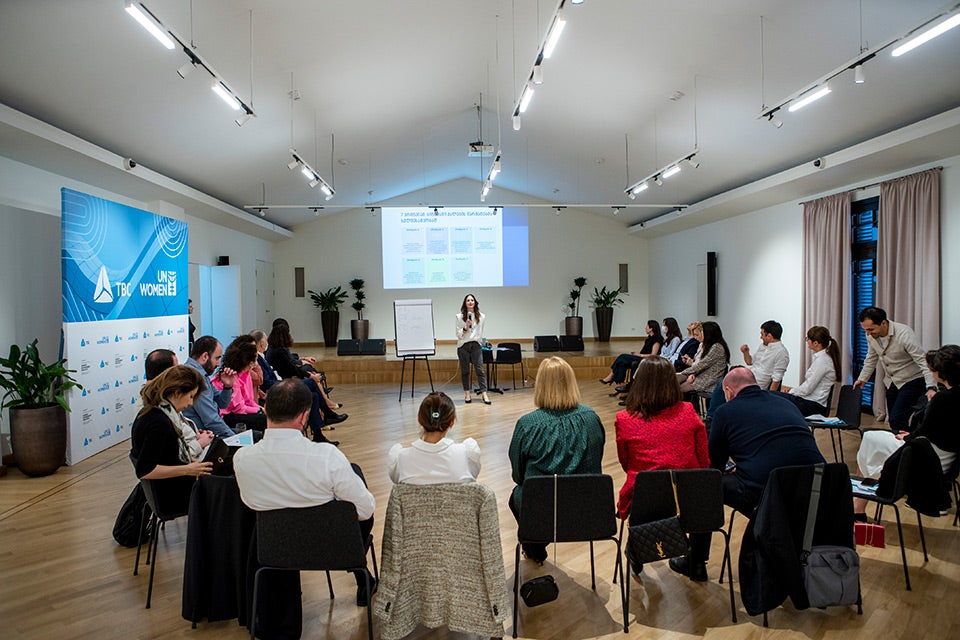Time-use data help spur more fathers to take paternity leave in Georgia
Date:

When his son was born in December 2023, 34-year-old Avtandil Tsereteli didn’t think twice about taking the paid paternity leave offered by his employer, TBC Bank, in Georgia.
“It was one of the most significant decisions I will ever make,” he says. “When you have time with your baby, it gives you such a huge pleasure that I had never experienced before, and I could not have imagined. You have to experience it to feel it. It’s one of the most beautiful experiences a parent can have.”
Tsereteli says he was encouraged by a fellow employee taking paternity leave in his department. Another father has also taken it since him.
“I don’t know any of my other friends or family that took paternity leave elsewhere,” he admits. “It’s a cultural thing. … Not a lot of companies encourage this practice, so there is a financial side. Also, many fathers don’t know they have this option, so we need education programmes.”
TBC Bank began encouraging male and female employees to take such leave after becoming a signatory of the Women’s Empowerment Principles (WEPs) in 2021 and signing a strategic partnership with UN Women Georgia in 2022. The bank began mandator gender equality trainings for all employees in early 2023, shortly after learning about the findings of the UN Women and GEOSTAT Time-Use Survey in Georgia 2020–2021 produced under the Women Count programme and published in December 2022.
Key findings included that women in Georgia spend half as much time as men on paid work (1.8 versus 3.5 hours per day) and twice as much time as men on unpaid work (2.9 versus 1.4 hours on care, and 3.8 versus 1.7 hours on domestic work, respectively). The gap widens significantly for working parents, as women employed full-time spend 5 times more time than employed men on unpaid domestic work (2.7 versus 0.5 hours per day) and 3 times more on unpaid caregiving (0.6 versus 0.2 hours, respectively).
“We are big users of these reports,” says Maka Bochorishvili, Environmental, Social and Governance Coordinator at Georgia’s TBC Bank. “Its important to understand the granularity of the data – and the analysis. That gives you the real insight!”
She says that in 2021 and 2022, not a single male employee of TBC took paternity leave. But after TBC started communicating the TUS findings in trainings, meetings and other communications – such as their Intranet, newsletter and Facebook group – and actively encouraging employees to make use of the company’s fully-paid parental leave of up to 6 months, four men took paternity leave in 2023.
“Not all men knew they could take it,” explains Bochorishvili. “But this perception that fathers can’t care for kids is also a stereotype we are changing. … In our society we still have a lot of traditional views. We’re happy that these perceptions are changing, but we still have a long journey ahead.”
The 2022 TUS report and other UN Women data were used by TBC to develop four mandatory staff training modules on gender equality, stereotypes, sexual violence and time poverty, as well as in-person classes that began in early 2023. More than 8,000 TBC employees take the mandatory trainings annually and more than 2,500 of TBC’s 8,000 staff have taken these weekly 4-hour in-person trainings for 35 randomly selected staff at a time.
“We understood that we need a dialogue,” says Bochorishvili. “In our meetings and trainings, we show them how much time women spend per day or week on unpaid care, self-care, entertainment, work, etc. When people see it on the board, it’s a big surprise. … When we explain the influence of gender stereotypes and social roles, which result in time poverty, it’s often emotional for them because they realize barriers in their personal and professional lives, and their impact on their decisions to apply for certain positions.”

Tsereteli took the in-person training in October 2023, when his wife was still pregnant. He says it was informative and an important part of changing mindsets.
“Many of us are biased and it’s not easy to change,” he says, “but gradually, trainings and spreading information through different channels can help people understand that parental leave is their right and privilege and some of the happiest times they can spend with their baby.”
Fellow WEPs signatory Terabank also began encouraging male employees to take its 4-month fully paid paternity leave after learning about the TUS findings, with one taker so far. Terabank will launch a campaign on Father’s Day to highlight the importance of men’s involvement in childcare.
Beyond private sector uses, Georgia’s TUS findings are also being used to improve the country’s Public Service Law, with a Gender Impact Assessment (GIA) jointly published by UN Women and Georgia’s Civil Service Bureau (CSB) in 2023. A working group was established in 2024 to develop a legislative amendment package based on its findings.
“Providing fresh impetus to our efforts, the GIA is a key document that aids us in advocating for gender-related issues at the policy level,” says Teimuraz Chikhradze, Head of the CSB. “By leveraging these insights, we can ensure that our policies and strategies are inclusive, equitable and forward-thinking.”
He says CSB has already integrated GIA recommendations in its Human Rights Action Plan for 2024–2026, ensuring that its policies are informed by thorough and gender-sensitive analysis, and plans to use the findings for the upcoming Gender Equality Action Plan, and the Civil Service Development Strategy and Action Plan.
The forthcoming changes, which are expected to include non-transferable paid paternity leave for public sector employees, combined with the private sector efforts currently underway, are collectively contributing to reducing cultural impediments for fathers to spend more time caring for their children.
Originally published on the global UN Women data hub.